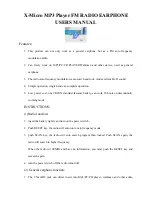
device to the water ground of the boat to help avoid the
interference.
Connecting a VHF Antenna
1
Mount the VHF antenna (sold separately) according to the
installation instructions provided with the antenna.
NOTE:
You can purchase a VHF extension cable. Go to
http://buy.garmin.com
or contact your Garmin dealer.
2
Connect the VHF antenna to the port on the VHF
115/215 AIS device.
NMEA 2000 Device Connections
NOTICE
If you are installing a NMEA 2000 power cable, you must
connect it to the boat ignition switch or through another in-line
switch. NMEA 2000 devices will drain your battery if the NMEA
2000 power cable is connected to the battery directly.
If you are unfamiliar with NMEA 2000, you should read the
“NMEA 2000 Network Fundamentals” chapter of the
Technical
Reference for NMEA 2000 Products
. Go to
www.garmin.com
/manuals/VHF115-215
.
Item
Description
À
Compatible NMEA 2000 chartplotter or other device
Á
VHF 115/215 AIS device
Â
Ignition or in-line switch
Ã
NMEA 2000 power cable
Ä
NMEA 2000 drop cable
Å
12 Vdc power source
Æ
NMEA 2000 terminator or backbone cable
Ç
NMEA 2000 T-connector
È
NMEA 2000 terminator or backbone cable
Connecting to a Remote GPS Antenna
This device includes an internal GPS antenna. If your mounting
location does not provide good GPS reception, you may install a
remote GPS antenna with a female BNC connector (not
included), and connect it to the device.
NOTE:
If you connected this device to a NMEA 2000 with a
GPS antenna, you can use that antenna as a GPS source
instead of installing a remote GPS antenna (
NMEA 2000 Device
Connections
, page 3
).
1
Follow the instructions provided with the external GPS
antenna to install it on your boat correctly.
2
Route the GPS antenna cable to the back of the VHF
115/215 AIS device, away from sources of electrical
interference.
3
Connect the GPS antenna cable to the BNC connector on the
wiring harness on the VHF 115/215 AIS device.
NMEA 0183 Device Connections
This diagram illustrates two-way connections for both sending
and receiving data. You can also use this diagram for one-way
communication. To receive information from a NMEA 0183
device on this device, refer to items
Ê
,
Ë
,
Í
, and
Î
in the
second table. To transmit information to a NMEA 0183 device
from this device, refer to items
Ê
,
Ë
,
Ï
, and
Ð
in the second
table.
Item
Description
À
Power source
Á
Power cable
Â
NMEA 0183 device
Ã
NMEA 0183 cable
Item
Garmin Wire
Function
Garmin Wire
Color
NMEA 0183
Device Wire
Function
Ê
Power
Red
Power
Ë
Power ground
Black
Power ground
Ì
Not applicable
Not applicable
Data ground (if
applicable)
Í
RxA (+)
Purple
TxA (+)
Î
RxB (-)
Gray
TxB (-)
Ï
TxA (+)
Blue
RxA (+)
Ð
TxB (-)
Brown
RxB (-)
Connecting to a Hailer Horn or PA Speaker
You can connect a VHF 215 AIS radio to a hailer horn or public
address (PA) speaker (not included) to use the microphone or
the handset to make announcements.
NOTE:
The VHF 115 radio cannot be connected to a hailer
horn.
1
If necessary, mount the hailer horn or PA speaker according
to the installation instructions provided with the device.
NOTE:
To avoid feedback, you should mount the hailer horn
or PA speaker at least 3 m (10 ft) away from, and facing
away from, the microphone or handset.
2
Route or extend the wire from the hailer horn or PA speaker
to the radio.
3
Connect the white wire on the radio wiring harness to the
positive (+) wire from the hailer horn or PA speaker.
4
Connect the green wire on the radio wiring harness to the
negative (-) wire from the hailer horn or PA speaker.
5
Cover the connections with a waterproof tape or heat-shrink
tubing.
Connecting to an External Speaker
You can connect the radio to an external speaker (not included)
to hear the radio at a remote location.
1
If necessary, mount the speaker according to the installation
instructions provided with the device.
2
Route or extend the wire from the speaker to the radio.
3
Connect the red wire on the radio wiring harness to the
positive (+) wire from the speaker.
4
Connect the black wire on the radio wiring harness to the
negative (-) wire from the speaker.
5
Cover the connections with a waterproof tape or heat-shrink
tubing.
3






















